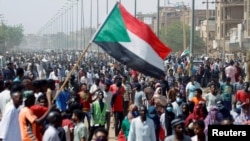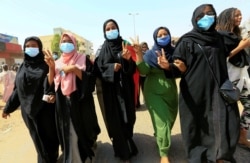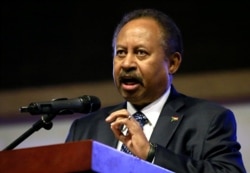One person was killed and several others injured during largely peaceful demonstrations in Sudan on Tuesday, a government spokesman said, as tens of thousands of people took to the streets demanding faster reform and greater civilian rule in the country's transition toward democracy.
Waving Sudanese flags, protesters gathered in Khartoum and its twin cities Khartoum North and Omdurman after the government closed roads and bridges leading to the center of the capital in the largest demonstrations since a transitional government took power late last year following the ouster of Islamist ruler Omar al-Bashir after three decades.
Similar protests took place across the country, including Kassala in eastern Sudan and in the restive region of Darfur. Protesters chanted "freedom, peace and justice," the slogan of the anti-Bashir movement. Some protesters blocked streets with burning tires.
The gathering on June 30 came on a highly symbolic day, as it was the anniversary of Bashir's ascent to power in a 1989 military coup and also marks the day one year ago when thousands marched to pressure the generals who assumed power after Bashir's ouster to resume negotiations over a peaceful power-sharing deal with civilian opposition.
Premier Abdalla Hamdok, a technocrat, governs the country in awkward tandem with the long-dominant military that helped remove Bashir after mass protests against his 30-year autocracy.
The opposition coalition agreed to joint governance with the military in a three-year transition toward free elections, but key parts of the deal have not been implemented, such as appointing civilian state governors and establishing a parliament.
While many protesters expressed their support for Hamdok during Tuesday's rallies, they renewed their calls for the transitional government to fulfill the agreement.
"Your demands are met with complete agreement," Sudan's information minister and government spokesman, Faisal Salih, said in a televised address.
Hamdok's government has been preoccupied with a worsening economic crisis. Sudan's pound currency has plunged, and annual inflation has topped 100%.
Last week, foreign donor nations pledged $1.8 billion at a conference hosted by Germany to help Sudan overcome the economic crisis hampering its transition. That was well below the $8 billion in aid Hamdok has said is needed.
The crisis has been compounded by the coronavirus pandemic, which has diverted the resources of many donors.
Hamdok sought to appease disgruntled citizens with a speech Monday night in which he said he would announce major decisions on the way forward within two weeks.
"The transitional government ... [is] aiming to achieve the highest levels of consensus and popular approval," he said, though he gave no details.
Hamdok is also pursuing peace talks with rebel groups across the sprawling country, a key priority for both the government and protesters, but no agreement has been reached yet.







